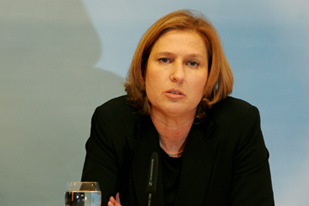Profile: Tzipi Livni
Israel’s scandal-free foreign minister could be the country’s next prime minister.

 |
| Livni has avoided the scandals that have dogged other Israeli ministers [AFP] |
Tzipi Livni, Israel’s foreign minister, could take over as the country’s prime minister if Ehud Olmert resigns over an ongoing police investigation.
The most powerful woman in Israel since Golda Meir, Israel’s prime minister in the 1970s, Livni enjoys a great deal of respect internationally as well as popularity at home.
She appears to have stayed clear of the scandals that have dogged other Israeli ministers and has escaped domestic recrimination over Israel’s 2006 war with Hezbollah.
In May last year, after a scathing report on Israel’s war in Lebanon, she called on Olmert to resign and said she would seek to take over as leader of the Kadima party.
In the end, though, Olmert did not step down.
Pragmatic stance
Born in Tel Aviv on July 8, 1958, Livni is a leading member of Kadima, the largest party in the Israeli parliament.
She is Israel’s second woman foreign minister – the post was also held by Meir – and has been Israel’s chief negotiator in peace talks with the Palestinians.
Livni comes from a well-known “ultranationalist” family, but has endorsed withdrawal from some occupied Palestinian lands as a pragmatic way to preserve Israel’s Jewish majority – if not to achieve a peace agreement.
First elected to the Knesset as a member of the Likud party in 1999, her father, Eitan, led the armed underground group Irgun in the 1940s, which fought for an exclusively Jewish homeland in Palestine and opposed partitioning the territory with Arabs.
Livni renounced any such views after defecting from Likud and joining Olmert and Ariel Sharon, then prime minister, in forming Kadima in 2005.
She said: “I came to the painful realisation that if I have to choose between a Greater Israel and Israel continuing to be a Jewish and democratic country, I must choose the latter.”
Politically inexperienced
Much of Livni’s political career is seen as being a result of her relationship with Sharon, under whom she served as justice minister.
She was also a key member of the team overseeing Israel’s disengagement from Gaza.
She came to politics just over a decade ago, following a stint in the Mossad foreign intelligence service – as a legal adviser, some say, while others speculate that she helped hunt Arab enemies abroad – and then a career as a corporate lawyer.
At times outspoken, she once called Mahmoud Abbas, the Palestinian president, “irrelevant”.
Her critics suggest that, as prime minister, she would have to work hard to make up for matters of state and military experience where she lacks expertise.
Livni, married with two children, is guarded about her private life.